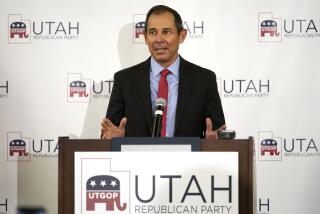GOP torn by change it can believe in
The bad news has come from Illinois, Louisiana and Mississippi -- a string of unexpected Republican defeats in congressional elections that have prompted GOP leaders to say, with candor unusual in politics, that the party is facing an outright catastrophe this November.
Increasingly, top Republicans are calling on their party to reinvent itself or risk driving away more voters and donors. The GOP image is so stale, said Rep. Thomas M. Davis III (R-Va.), in a memo to colleagues last week, that “if we were a dog food, they would take us off the shelf” because nobody is buying it.
But even while facing crisis, the GOP is finding that change, if it comes, will not come easily.
The difficulty of a swift reinvention was on display last week as the central players in Washington’s conservative community gathered for their weekly strategy session, the Wednesday Meeting, held in a conference room of Grover Norquist’s Americans for Tax Reform organization.
A senior advisor to the GOP’s presumptive presidential nominee, John McCain, was on hand along with the Republican Party’s national chairman to make the case for McCain’s brand of Republicanism.
McCain’s approach -- tough on taxes, but receptive to immigrants and committed to easing global warming -- could help paint the GOP in new colors, more attractive to independent voters, Latinos and women. Some GOP leaders now say that by embracing McCain and his policy platform, Republicans would instantly “rebrand” and reinvigorate their party.
At first, that message from McCain advisor Carly Fiorina and RNC Chairman Mike Duncan seemed to resonate with the 200 or so Republicans in the room, many still absorbing the loss only hours before of a Mississippi House seat once considered among the party’s safest.
But one participant at the Wednesday Meeting rose to question the soundness of the Arizona senator’s plans for more government action to combat global warming. Similar ideas, the speaker said, had proved to be a disaster in Europe. Heads nodded and dozens of economic conservatives and global-warming skeptics applauded.
Global warming is one of several knotty topics causing Republicans to skirmish among themselves as they reckon with a horrific political landscape: President Bush’s record-low approval ratings, an unpopular war, a sagging economy and persistent scandals.
Before last week’s loss in a special congressional election in Mississippi, the party took a similar hit at the beginning of the month in Louisiana and, in March, another in Illinois.
The disconcerted and divided mood of the party contrasts sharply with its optimism and unity only a few years ago around plans to build an era of political dominance.
As with global warming, those who want a tough line on immigration and border security have also been at odds with the McCain.
U.S. Rep. Tom Tancredo of Colorado wrote on the website Townhall.com that McCain and the Republican National Committee were hurling “obstructions” at members of Congress who want to run on the “winning issue” of tough border and immigration enforcement. Tancredo took aim at McCain’s decision to speak to a Latino civil rights and advocacy organization, National Council of La Raza, accusing the presidential candidate of “shameful pandering to a special-interest lobby.”
Budgeting and earmark reform also prompted squabbling among Republicans in the last week. McCain and his allies say the GOP can rebrand itself as the party of reform by fighting pork-barrel spending and ending congressional earmarks, the narrowly drawn instructions that individual members slip into legislation that often benefit a specific company or individual.
But as the White House and McCain disparaged the $300-billion farm bill under consideration last week as one example of overspending and earmarking projects, Minnesota Sen. Norm Coleman and other key farm state Republicans up for reelection this year voted for it.
This kind of tension demonstrates how difficult it may be to develop a policy consensus, even though there is widespread acknowledgment that the party may face significant losses in November without it.
McCain’s supporters argue that that his policy proposals would bring a new image to the party, one that solves its problems by recalling old virtues of conservatism -- such as spending control and smaller government -- while appealing to key groups of voters needed by the GOP: Latinos, women and young people.
Like President Bush, McCain has split from the party base in backing more liberal immigration laws and criticizing conservatives for ethnically insensitive rhetoric.
As a result, McCain aides believe now that the Arizona senator has the potential to do well among Latino voters, perhaps winning more than the 40% that Bush did in 2004. That, they say, could assure victory in Colorado, New Mexico and Nevada -- states the Democratic nominee would have to carry in order to win. It could also help McCain win Florida, a state he cannot afford to lose.
While reaching out to Latinos, McCain showed last week that he is fully aware of the risks that his immigration stance poses in alienating a vocal portion of conservative Republicans.
He chose his words carefully when he delivered a major address in Columbus, Ohio, laying out his first-term goals.
He predicted that he would fix the country’s immigration problems through “tremendous improvements to border security infrastructure and increases in the border patrol, and vigorous prosecution of companies that employ illegal aliens.” By 2013, he said, he hoped “illegal immigrants who broke our laws after they came here [will] have been arrested and deported.”
Only then did McCain offer some of his more familiar rhetoric that some say is welcoming toward illegal immigrants. He predicted that with the borders secured, Americans would accept the “practical necessity to institute a temporary worker program and deal humanely with the millions of immigrants who have been in this country illegally.”
In other recent speeches, McCain promised conservative judicial appointments and affirmed his commitment to gun rights. And, despite his past opposition to some of Bush’s tax cuts, he now pledges to keep them in place.
His efforts show signs of paying off. Republican strategists who once sought to annihilate McCain for his independence are now enthusiastically backing his candidacy, offering strategic advice and affirmation of his conservative credentials. They include Bush’s former senior strategist, Karl Rove; and Norquist, the anti-tax activist.
Norquist acknowledges that McCain’s approach to capping global warming emissions has inflamed some conservatives, calling it the most significant issue dividing the party now.
More important than angering conservatives, Norquist says, is that McCain’s position means “he won’t be able to draw a sharp contrast” with his Democratic opponent on this topic, and thus will miss the opportunity “to do what Bush did to Gore: travel the coal states and tell workers that the Democratic candidate favors environmental rules that will cost you your job.”
McCain strategists say their candidate’s global warming position is substantively correct and provides a clear way to distinguish him from the unpopular current president. Still, the McCain approach to reducing greenhouse gases -- a government-run system to cap emissions -- continues to draw heated objections.
Economic conservatives believe McCain’s so-called “cap and trade” system is unworkable, violates free-market principles and would harm business interests.
Some question whether McCain overstates the threat of warming.
And the controversy is not cooling.
Late last week, conservative commentator Rush Limbaugh castigated McCain for his “embrace of a radical environmental agenda,” calling it a sign that the Republican Party “is abandoning conservatism, abandoning those things and those people that made it victorious.”
McCain’s chief economic advisor, Douglas Holtz-Eakin, said taking on the problem of global warming could prove beneficial for the party.
“We are looking at an electoral environment which is extremely difficult for Republicans,” he said. “In those circumstances, everyone should rethink existing positions carefully.”
--
--
peter.wallsten@latimes.com
More to Read
Get the L.A. Times Politics newsletter
Deeply reported insights into legislation, politics and policy from Sacramento, Washington and beyond. In your inbox three times per week.
You may occasionally receive promotional content from the Los Angeles Times.






